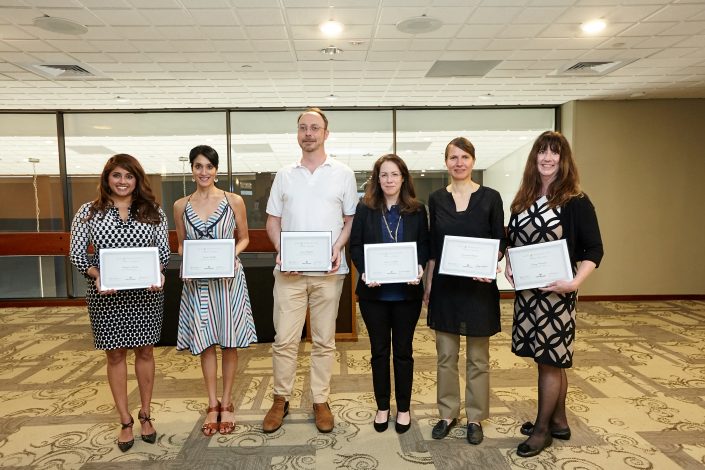Arts & Humanities Fellowships presented to six Texas A&M University faculty members

Arts & Humanities Fellows for 2018 are (from left): Rumya Putcha, assistant professor in the Department of Performance Studies; Vanita Reddy, associate professor in the Department of English, affiliated with the Women’s and Gender Studies program; Evan Haefeli, associate professor in the Department of History; Erin A. Snider, assistant professor in the Department of International Affairs; Susanneh Bieber, assistant professor in the Department of Visualization and the Department of Architecture; and Nancy Warren, professor in the Department of English. (Image: Division of Research)
Texas A&M University named six faculty members as 2018 Arts & Humanities Fellows during an awards luncheon today at the University Club in Rudder Tower. Each fellowship includes a three-year grant of $15,000 to support a scholarly or creative project.
Since its launch in 2015, the Arts & Humanities Fellowship Program has sponsored projects by twenty-three faculty members, including the six new fellows.
Texas A&M Vice President for Research Mark A. Barteau said, “We are excited about the outstanding projects that our 2018 Arts & Humanities Fellows will pursue and the new scholarship they will create over the next three years. While it is sometimes easy to be dazzled by the products of science and technology, we must never forget that the arts and humanities are the lifeblood of civilization. With the support of these fellowships, scholars at Texas A&M will continue to advance the visibility and vibrancy of research here in the arts and humanities.”
Each spring, Arts & Humanities Fellows are selected by a peer review based on merit and originality, professional qualifications, clarity, benefit to the public and the quality of the overall presentation. All Texas A&M faculty who engage in scholarship in the humanities or in creative work in the arts are eligible to apply for the fellowships.
At today’s luncheon, Arts & Humanities Fellowships for 2018 were presented to the following faculty members:
Susanneh Bieber, assistant professor in the Department of Visualization and the Department of Architecture, College of Architecture, will use her expertise as an art historian to recover the works of Victor Lundy—a rising star among 1960s architects whose works are now largely forgotten—by focusing on Lundy’s organic approach to architecture.
Evan Haefeli, associate professor in the Department of History, College of Liberal Arts, will complete a new book, Anti-popery: The First Bias of American Freedom, which will take a long view of anti-Catholicism from colonial America into the 20th century to reveal the surprising and unpredictable ways that anti-popery ideology has shaped the American experience of freedom.
Rumya Putcha, assistant professor in the Department of Performance Studies, College of Liberal Arts, will fund essential research on her second book project, Namaste Nation: Commercial Yoga Industries and Neo-Orientalism in the 21st Century America. This project will identify the crucial role of this leisure activity in 21st century gender and racial formation.
Vanita Reddy, associate professor in the Department of English/Women’s and Gender Studies, College of Liberal Arts, will visit three essential archives to support her current book, Global Intimacies, which will examine cultural production from the global South Asian diaspora—North America, East Africa, South Africa, the United Kingdom, and the Caribbean—in relation to black and indigenous populations.
Erin A. Snider, assistant professor in the Department of International Affairs, Bush School of Government and Public Service, will use her fellowship to support research in the Middle East and contribute to a new book project examining the political economy of the Arab Spring, Engineering Transition: The Political Economy of Aid and Security in the New Middle East.
Nancy Warren, professor in the Department of English, College of Liberal Arts, will analyze legacies of medieval religion in the cultures and texts of the three major colonizing populations of the Americas: English, French, and Spanish, for a new book, Hemispheric Medievalisms: The “Old Religion” in the New World, 1550-1850.

